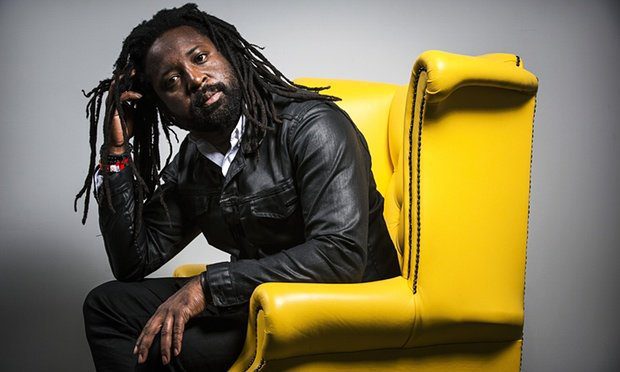Marlon James’s third novel is epic: hefty in grammes, timespan, ambition and structure. It has been described as a cacophony, a din of voices, telling their stories, often in patois; and in tangent, the story of the 1976 assassination attempt on the singer Bob Marley. Some passages are almost made for singing. Odd pairs of words are spliced in rhyme: lockdown and downtown, sistren and shitstem. There are so many voices. The book’s cast list names 76 characters. Fifteen have speaking parts. Even James used to open his laptop and think: “Who am I going to see today?” The effect is clamorous. And as the death toll mounts, each name at the head of a new chapter is as ominous as an engraving on a tombstone.
So it comes as a surprise when James says that A Brief History of Seven Killings, which won the Man Booker prize 2015 on Tuesday night, began life with only one voice, one character, to whom the story wholly belonged.
His novel was not the favourite for the award (that was Hanya Yanagihara’s A Little Life), but there were whoops in the audience when he was announced as the winner.
To whom, though, did his story first belong? Could it be Papa-Lo, the gang don who finds his softer side and is punished with deposition? Nina Burgess, the anchor who helped pull James through the whole novel? Or the appalling Dr Love, whose shadow lengthens across those mighty 688 pages?

James shakes his head.
“John-John K. He was the first.”
There is a pause; John-John K is a minor character who figures only in the book’s final third. “I usually am surprised, too,” he says. “Page 458. First page I wrote! I was writing a totally different kind of novel.”
The discovery that John-John K was the originating voice casts the novel’s trajectory in fresh light. A gay hitman from Chicago, John-John K performs two crucial jobs, one of which is to help Weeper, a gay gangster who has moved to the US from Jamaica, to affirm a kind of peace with his sexuality. (James laughs when he says that this fourth part was the only one he vetoed his mother from reading.) When James started writing A Brief History, with John-John K as the main character, did he mean to write a “gay” novel?
“If I’m going to go by how the book really started, yes,” he says. “It was a gay hitman going through boyfriend troubles, trying to kill someone. When the overall architecture showed up, it made sense to me. All of those tricky sexualities, the things we do to get accepted, and the things we do that make us acceptable, I really wanted to talk about that.” He says A Brief History is “a novel of exile”. (He once described himself as “post-postcolonial” but now rejects that label because “it implies that whatever you’re doing, it’s the still-dominant context”.)
Weeper’s meanness eases as he learns to accept himself. “From the get-go he was a gay character. And not just a gay character,” James says. “When people talk about homosexuality, the perception of homosexuality itself is one thing, but then there’s the perception of the role you play. Are you the top, the bottom? Are you submissive? There’s always someone who’s doing it and a person who it’s being done to. I deliberately played with that.”
James, 45, was born in Jamaica in 1970, and grew up in Portmore, an affluent suburb of Kingston: “a classic sort of suburb, like you see on the outskirts of London.” Big house, garage for the car, that sort of thing. “My dad got busy,” he says, so there were four children in the house, plus four further siblings from other relationships.
James was six at the time of Marley’s attempted assassination. The news reverberated around the house; not surprising given that his mother worked as a detective and his father at law school (he would become Justice James). “I like to think I was a pretty smart six,” James says. “I certainly knew what a criminal was. I certainly knew what a gunman was.” But the newsreel of the assassination attempt “made no sense. Adults weren’t giving us context.” The plot, his sense of his parents’ struggle to understand it, struck him with force. “You remember the first time your dad is no longer Superman,” he says. The look on his parents’ faces was pure uncertainty. “What is going to happen?”

Some reviewers have disliked the fact that James refers to Marley throughout A Brief History as The Singer, but James says that when he tried writing out Marley’s name, “it felt wrong. I wanted the Marley I knew. And the fact is, the Marley I knew was not a real person. I never touched him, I never heard him, I was never in the same room with him. By 1976, Marley was a kind of fable. The Marley I knew is what I saw on TV, heard in clubs. He was very much a virtual. Everywhere and nowhere. And for most people, the Marley that I write about is the Marley they know.”
James has said that in the lefthand corner of his manuscripts, he likes to jot down the music he listened to while writing. For A Brief History of Seven Killings, Augustus Pablo’s John Peel sessions helped to see him through. “I grew up with reggae,” he says. “Reggae is like family. I know it and there’s a type of love and familiarity, but sometimes you want to hang out with other people.”
It was not reggae but pop, for instance, that helped him through his difficult teenage years. In a 2006 blog, uploaded the year after his debut novel, John Crow’s Devil, was published, James described how he was bullied at school. The tone is jocular, but one sentence leaps out. “I think the only reason I’m still here,” he wrote, “is my cowardice about suicide.”
“Is that [blog] still up?” he asks, sounding surprised. Then he drops his voice to a whisper. “My God, it must be so embarrassing now.”
Day after day, at Wolmers Boys School, the torments and taunts mounted. Why? “I was the nerd,” he says. “Because I was reading. I wasn’t into sports. I was really into art. Very geekish about comics. Assumed gay.” To cope with the bullying, he read more and more. “Let’s just say I was in the world of books far more than I was in the real world. It became a sort of addiction. I just couldn’t deal with the present tense. Jeanette Winterson says this somewhere, that reading is an act of liberation, but it’s also a private act. I really did end up losing myself that way.”

His other saviour was music. “The single high point of my day was staying up till 12 o’clock when Jeanie Hastings came on the radio and played usually pop music. Eurythmics. Pet Shop Boys.” It was, he says, another “opportunity to vanish”.
It must have been frightening to contemplate where the instinct to vanish might lead, and it is impossible not to wonder how seriously he intended his remark about suicide.
“You don’t want to make lightly of suicidal feelings,” he says. “A bad day is the worst day ever at 14.” Then he corrects himself. “That is actually not bad. The drama is fine. If I go” – and he adopts a theatrical voice – “‘I feel like I want to kill myself!’, that’s fine. It’s when you come to peace with it?” He presents this last statement as a question, as if there might be something else to say, but there is no answer, no end to the sentence. What does he mean?
“This is one of the reasons I’ve been really good – that sounds like I’m giving myself credit – but I have been able to recognise sometimes when students are about to cross that line.”
For the past eight years, James has taught creative writing and literature at Macalaster College in St Paul, Minnesota. When students are in trouble, he says, “everybody is looking for the noise and the histrionics and the tears. I’m like, no. I’m looking for the person who’s too calm.”
He begins to address a third person, who might be this speculative student who is in trouble, or, who knows, might be James’s teenage self, or the equally troubled James of his twenties. “You’re a little too at ease,” he says, “and I know what’s going on in your life. You’re letting go, aren’t you? And that I know. It’s a weird sort of peace. I’m going to take myself out.”
James did not come out as gay in Jamaica. Like his character Weeper, he waited till he got to the US. And then he waited some more. Having gone there as a creative writing student, then converted to teaching and finally grown into a feted author, earlier this year, he came out. The New York Times commissioned an article. They “just gave me a prompt,” he says. “‘Voyage to myself,’ I thought. And that’s where I came out. A small coming out. Just 50 million people.” You can hear Minnesota creeping into James’s voice, alongside Jamaica.

It is interesting that this act coincided with the widespread and wholehearted approval of his work by the literary world. How fitting that his mouthpiece should be the New York Times. And yet, James might never have been discovered if it were not for a quirk of fate that brought the American novelist Kaylie Jones to Jamaica’s Calabash book festival in 2003. Back then, James was 33 and had written off his own writing career after receiving 78 rejections from US publishers for his novel John Crow’s Devil. The last said – and maybe the remark seemed to be addressed to his person as well as his work – “Not for us”. He deleted his manuscript.
It is testimony to his thoroughness, commitment and possibly a destructive streak, that James not only disposed of the novel on his own computer but “went to all my friends’ houses and took it off their computers too. Erased any trace of it. I just thought if so many people thought this was not good, it couldn’t possibly be good. Maybe I wasn’t meant to be a writer.”
Surely there was something of himself in there that he would want to save, if only to lock away in a hidden box or drawer?
“No! No,” he says, shaking his head, as if it is the question that is mystifying. “This is why I tell students when they ask for advice, if you’re a writer, you have to believe in yourself.” He bangs accompaniment to the last three words with his hand on the table. “Because if you’re a writer, you’re going to come across that moment where you’re the only one who does.” He sounds freshly disappointed when he adds: “And I failed that test.”
Failed? The words seems misplaced, especially the morning after winning the Booker. But maybe that is understandable, because his escape was such a close thing. When Jones arrived at the Calabash book festival 12 years ago, James went to her creative writing workshop only because he had been accepted the year before and attendance seemed preferable to rudeness. He took no manuscript. In his new identity as failed writer, he worked as a copywriter, graphic designer and location scout. (This last put him on familiar terms with the ghettos and slums of A Brief History. He says that film crews would turn up and exclaim: “‘Oh my God, it’s not violent at all! It’s so peaceful!’, unaware that “the night before I went to every gunman and gave them $200 and said: ‘Just don’t do anything today.’”) So James attended Jones’s class, completed the set exercises. “This is really great,” she told him. “Do you have anything I can read?”
He said he did not.
“He wrote a novel! He just doesn’t want you to see!” his classmates chimed.
James went home and managed to track down the one friend who had disobeyed or neglected his injunction to destroy the text. He gave it to Jones on a Sunday. She read it in three days, then called two friends. One was an editor, the other an agent. In 2005, John Crow’s Devil was published.
I called Jones 20 minutes after James was announced as the Booker winner. She was crying when she said: “His writing was so confident. There was not one word that wasn’t precise. That voice was already there.” Crying with happiness, and because she knows what James endured before the literary world decided to accept him. “I was stunned that nobody had said, we should take this seriously, that nobody had recognised his talent. Everything he has now and is now, he was then.”
On Tuesday night James described his Booker win as “affirming”. He uses the same word when he talks about Jones’s initial interest. The process of affirmation has been a long one. “It’s not like I’m sitting on, waiting for foreigners to tell me I’m good. But I’m sitting on waiting for people who are participating in the world language of literature to say: ‘This can stand up’.”
Not for us, someone said. Luckily for them, James can’t remember their name.
guardian.co.uk © Guardian News & Media Limited 2010
Published via the Guardian News Feed plugin for WordPress.





